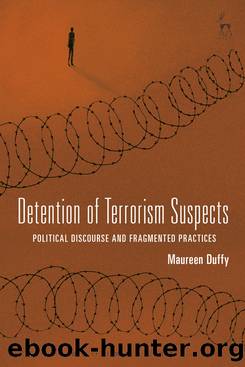Detention of Terrorism Suspects: Political Discourse and Fragmented Practices by Maureen Duffy

Author:Maureen Duffy [Duffy, Maureen]
Language: eng
Format: epub
Tags: law, Criminal Law, General
ISBN: 9781849468640
Google: 5BXrsgEACAAJ
Publisher: Bloomsbury Academic
Published: 2018-02-08T23:24:46.253950+00:00
B.Secret Detentions
Another characteristic of the altered detention practices after 9/11 is that traditional notions of procedural fairness have frequently been eroded for those suspected of terrorism. Separate and apart from overarching changes relating to the presumption of innocence, specific components of what have been deemed elements of fair process have also undergone a perceptible shift in some cases. Traditionally, with certain, express exceptions, the presumption has been for criminal proceedings to be open, with the general idea that such openness helps to ensure fairness.91
Secrecy, however, became a major aspect of terrorism detentions after 9/11, usually on the basis that it was necessary for national security reasons. The extent of this secrecy has varied considerably and it has evolved, as do the specific aspects of detentions to which secrecy is claimed to apply. For example, the US stands out among other nations in having sought to keep the very fact of detention a secretâa practice that seems to have been less common in other liberal democracies that altered their practices after 9/11.92 It was based on that secrecy that, for instance, the Center for Constitutional Rights, in representing the Turkmen plaintiffs, a group of âspecial-interestâ detainees held in the US under its immigration system shortly after 9/11, represented to the Court that it could not identify all the members of the class.93 This case, consolidated with others, wound its way through the US courts for years. The Supreme Court of the United States ruled generally in favour of the government, for a variety of reasons, in June 2017.94
It is now known that, shortly after the 9/11 attacks, the US government ordered that immigration proceedings for the so-called âspecial-interest detaineesâ be held in secret, including an order that the very fact of their detentions be kept secret.95 This policy became widely known after publication of the âCreppy Memoâ, which lays out the parameters of secrecy to be applied to these cases.96
The American processes frequently included secretly detaining people overseas as well, often through secret transfers, known as âextraordinary renditionâ.97 The US has been accused of secret practices that could arguably be characterised as kidnapping for the purpose of torture, with detention sites in different places, known as âblack sitesâ.98
One example involves the case of Majid Khan. Khan had previously been granted asylum in the US and grew up outside of Baltimore, Maryland.99 He alleged that, while on a trip to Pakistan in March 2003, he was kidnapped. He further alleges that he was then held in secret by the CIA for three and a half years, during which, he says, he was tortured.100 Previously classified information that was cleared for release in 2015 corroborates Khanâs version of the torture. The information revealed that he had been waterboarded twice; sexually assaulted, including while being hung naked from the ceiling; hung from a wooden beam for days while naked and provided with no food; kept in total darkness for most of 2003; held in solitary confinement for two years; beaten and threatened with beatings, including with a hammer; and hung from a metal bar on order of a doctor at Guantanamo.
Download
This site does not store any files on its server. We only index and link to content provided by other sites. Please contact the content providers to delete copyright contents if any and email us, we'll remove relevant links or contents immediately.
Killers of the Flower Moon by David Grann(3228)
Machine Learning at Scale with H2O by Gregory Keys | David Whiting(2264)
Will by Will Smith(2032)
Guns, Germs and Steel by Diamond Jared(1876)
Borders by unknow(1779)
The Room Where It Happened by John Bolton;(1717)
The Color of Law by Richard Rothstein(1574)
Once Upon a Broken Heart by Stephanie Garber(1471)
Water Rights and the Environment in the United States by John Burch(1412)
Examples & Explanations: Administrative Law by William F. Funk & Richard H. Seamon(1324)
Friends, Lovers, and the Big Terrible Thing by Matthew Perry(1321)
A Short History of War by Jeremy Black(1295)
Pharmacy Practice and The Law by Richard Abood(1252)
HBR's 10 Must Reads 2022 by Harvard Business Review(1251)
That Every Man Be Armed by Stephen P. Halbrook(1236)
The Strength In Our Scars by Bianca Sparacino(1234)
The Guarded Gate by Daniel Okrent(1218)
515945210 by Unknown(1205)
Injustices by Ian Millhiser(1196)
